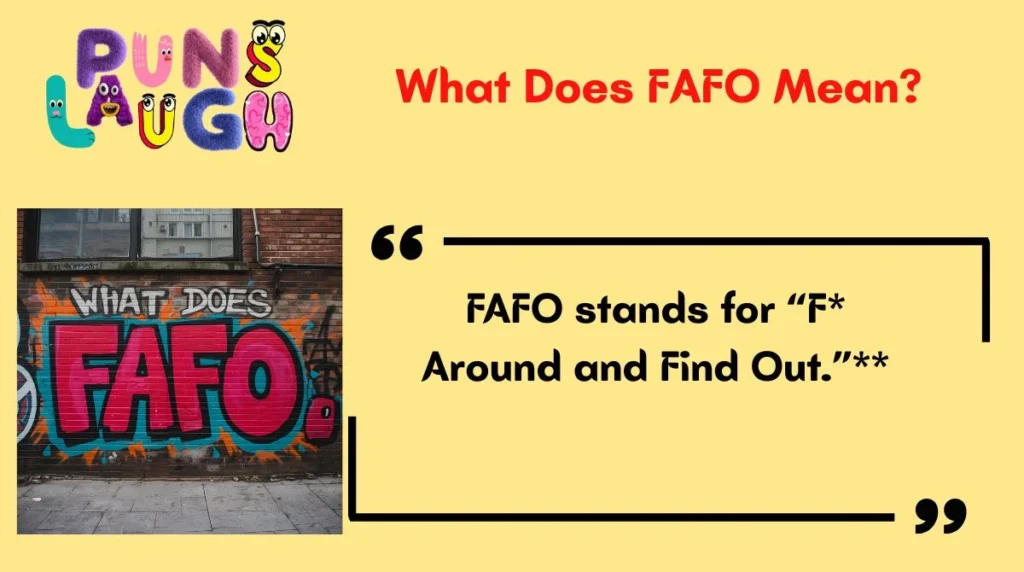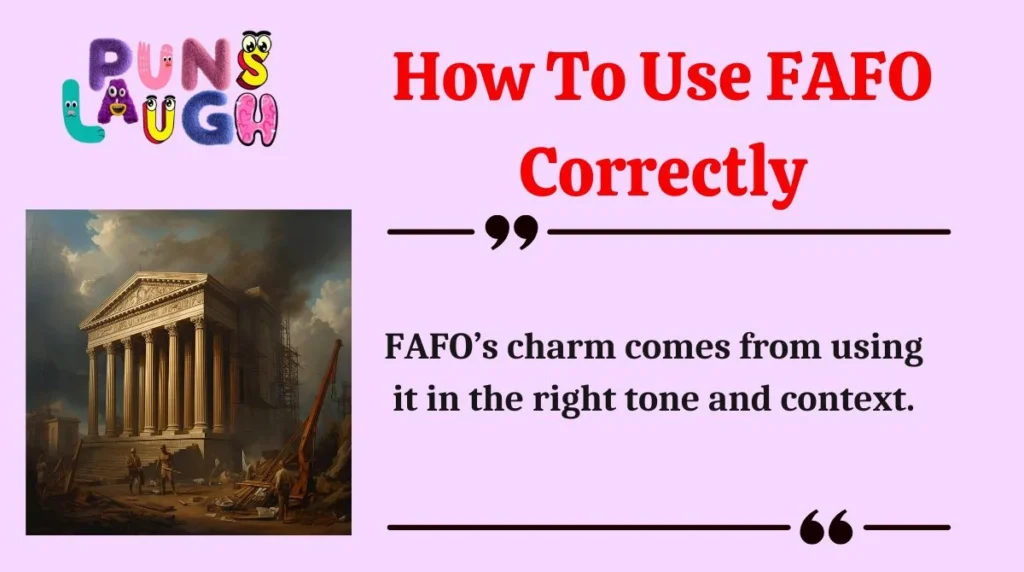Slang moves fast online. One day a phrase appears in a meme, the next it’s being shouted at rallies or turned into courtroom evidence. FAFO is one of those phrases.
If you’ve seen people drop “FAFO” in comment sections, on TikTok, or even in news headlines and wondered what it really means, you’re in the right place.
This guide breaks down everything about the phrase — its origin, rise to fame, proper use, and why it matters.
What Does FAFO Mean?

FAFO stands for “F* Around and Find Out.”**
The phrase carries a mix of humor and warning. In plain terms, it means: “If you act recklessly or push boundaries, you’ll face the consequences.”
Some points to remember about its meaning:
- Tone: Often blunt, edgy, sometimes playful.
- Context: Most common in online debates, memes, gaming culture, and social media reactions.
- Connotation: Suggests that someone’s behavior will trigger an inevitable response — usually not a pleasant one.
Quote: A popular way to explain FAFO is:
“Play stupid games, win stupid prizes.”
In essence, FAFO captures the internet’s love for snappy, consequence-driven comebacks.
The Origins of FAFO
Although FAFO feels modern, it stems from older slang and phrases.
- Street and Military Roots: The spirit of FAFO — warning someone not to provoke trouble — has long existed in military and street language.
- Internet Forums: The acronym itself started appearing in online forums like Reddit and 4chan around the late 2000s to early 2010s.
- Memes and Viral Culture: By the mid-2010s, it became widely known thanks to meme pages and reaction images.
Fun Fact: The phrase got a major push in popularity during the 2020s as short-video platforms like TikTok embraced bold, snarky captions.
FAFO in Politics and Public Discourse
The leap of FAFO from internet slang to politics shows how quickly language moves today.
- Politicians, activists, and online commentators have used the phrase in speeches, protests, and social media posts.
- It often appears in heated debates or confrontations, where it signals that crossing a line will bring backlash.
- The phrase embodies a spirit of “stand your ground” — making it particularly resonant in political settings.
In political discourse, FAFO is less about humor and more about drawing a line in the sand.
FAFO in Military and Law-Enforcement Context
Many people associate FAFO with military and law-enforcement culture.
- Military Influence: Soldiers often use blunt phrases to warn adversaries. FAFO fits that style, though it isn’t an official military term.
- Law-Enforcement: Some police officers and tactical trainers have adopted the phrase informally as a warning about resisting lawful actions.
- Contextual Difference: In casual speech FAFO can be funny; in tactical or security settings it’s often a serious caution.
This dual nature is why FAFO sometimes sparks controversy — its tone shifts depending on who says it and why.
FAFO’s Explosion on TikTok and Social Media
Social media turned FAFO into a pop-culture phenomenon.
- TikTok Memes: Creators pair the phrase with videos showing people making reckless choices and then suffering immediate consequences.
- Hashtags: Tags like #FAFO and #FindOut often rack up millions of views.
- Influencers and Viral Clips: Popular personalities have used the term in reactions to fights, pranks, and political debates.
The platform’s short-form video style made it easy to show the “cause and effect” behind FAFO — someone “messes around,” then “finds out.”
How To Use FAFO Correctly

FAFO’s charm comes from using it in the right tone and context.
✅ Appropriate Uses
- Jokingly teasing a friend who makes a bold move in a video game.
- Captioning a meme that shows a bad decision leading to an obvious outcome.
- Commenting humorously on viral fails or stunts.
⚠️ Usage Tips
- Mind the Audience: Some people find it offensive because of the explicit word.
- Tone Matters: Written text can seem harsher than spoken jokes.
- Don’t Overuse: Like all slang, it loses impact if used everywhere.
When To Use FAFO
- Online Banter: Memes, Reddit threads, gaming chats.
- Storytelling: Describing an event where someone faced instant consequences.
- Humorous Commentary: Social media captions for “fail” videos.
Think of it as a punchy, playful phrase for casual conversations — not for formal or professional settings.
When NOT To Use FAFO
Knowing where not to use FAFO is just as important as knowing when to use it.
- Professional Settings: Emails, workplace conversations, or business meetings.
- Formal Communication: Legal documents, academic papers, or public speeches.
- Potential Threat Contexts: Using it in a way that seems menacing can cause serious misunderstandings.
In short, FAFO works best as internet slang, not as real-life confrontation.
Real-World and Online Examples of FAFO
| Scenario | Example of FAFO Use | Tone |
|---|---|---|
| Gaming Chat | “You attacked the boss with no gear? FAFO.” | Playful, teasing |
| Social Media Caption | Video of someone ignoring safety warnings: “FAFO moment!” | Humorous |
| Political Rally Sign | “Try to take our rights — FAFO.” | Serious, confrontational |
| Viral News Story | Headline quoting witness: “He FAFO’d and ended up in jail.” | Serious, cautionary |
These examples show how the meaning shifts depending on context and tone.
FAFO in Law and Court Cases
FAFO has occasionally made its way into legal contexts.
- In some disputes, social media posts with FAFO have been presented as evidence of intent or provocation.
- Courtrooms generally treat such phrases seriously because they can imply threat or aggression.
- Legal experts warn that using slang like FAFO in serious disputes can backfire, as it may be misinterpreted.
The transition of FAFO from memes to courtrooms highlights the phrase’s cultural penetration — and the need for caution.
FAFO Compared to Other Internet Acronyms
| Acronym | Full Form | Tone | Typical Use |
|---|---|---|---|
| FAFO | F*** Around and Find Out | Warning, consequence | Calling out reckless actions |
| YOLO | You Only Live Once | Carefree, daring | Encouraging risk-taking or bold choices |
| GTFO | Get The F*** Out | Dismissive, abrupt | Telling someone to leave or stop |
| WTV | Whatever | Casual, indifferent | Dismissing or minimizing a comment |
Unlike YOLO, which celebrates risk, FAFO warns about it. This contrast explains why the phrase often pops up in videos that show “instant karma.”
Cultural Impact of FAFO
FAFO’s journey reflects how internet slang shapes modern culture.
- Meme Evolution: Started as edgy text on forums, became mainstream through video content.
- Music and Entertainment: Some songs and podcast episodes reference FAFO to express defiance.
- Mainstream Recognition: News outlets and public figures use the phrase, proving its reach beyond internet circles.
It’s more than just a meme now — it’s part of the digital vocabulary used to discuss consequences.
FAQs About FAFO
What does FAFO stand for exactly?
FAFO stands for “F* Around and Find Out,”** a phrase warning that reckless actions will bring predictable consequences.
Is FAFO considered offensive?
Yes, it contains explicit language. In casual online spaces it’s often accepted, but in formal or sensitive settings it’s inappropriate.
Did FAFO originate in the military?
Not officially. It’s widely used by some in military and law-enforcement circles, but it grew popular mainly through internet culture.
Why did FAFO become popular on TikTok?
Because short-form videos make it easy to show “cause and effect” moments that fit the FAFO message — bad choices leading to quick consequences.
Can FAFO be used in professional communication?
No. It’s informal slang and can be seen as rude or even threatening in workplaces or official settings.
Final Thoughts
The rise of FAFO shows how a simple, sharp phrase can move from online jokes to political slogans and even legal evidence.
At its core, FAFO is about accountability — if you provoke the wrong way, you’ll face the fallout. While its tone may be edgy, it reflects a timeless principle: actions have consequences.
Whether you encounter it in memes or headlines, understanding the meaning and context of FAFO helps you navigate today’s fast-moving internet slang landscape.





